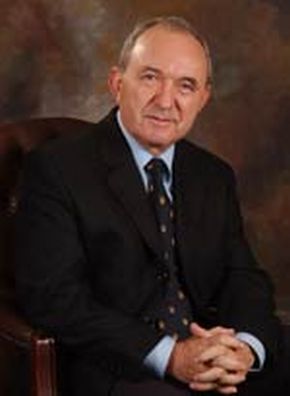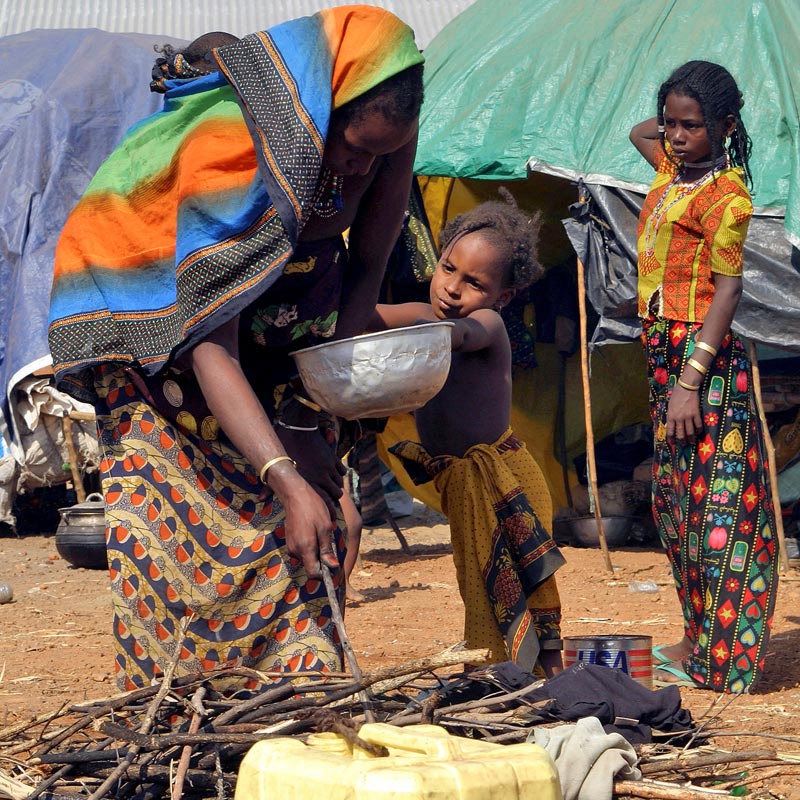
MacArthur honored Justice Richard Goldstone, former Chief Prosecutor of the International Criminal Tribunals for Rwanda and the former Yugoslavia, with the MacArthur Award for International Justice. The Award was presented at a dinner held in The Hague, the international city of peace and justice, which is home to more than 150 international legal organizations and judicial tribunals, including the International Criminal Court and the International Court of Justice. Guests included representatives from the diplomatic and judicial communities, as well as civic and nonprofit leaders.
As the first Chief Prosecutor of the Tribunals for Rwanda and the former Yugoslavia, Goldstone helped shepherd these courts, the first of their kind since Nazi war criminals were tried at Nuremberg following World War II. In 1995, Goldstone filed charges of genocide and crimes against humanity against Bosnian Serb leaders Radovan Karadzic and Ratko Mladic for their roles in the “ethnic cleansing” of Bosnian Muslims, as well as torture, rape, the shelling of Sarajevo, and the sacking of mosques and Catholic churches.
Prior to his appointment as Chief Prosecutor in 1994, Goldstone was chair of the Commission of Inquiry Regarding Public Violence and Intimidation (commonly called “the Goldstone Commission”) in the aftermath of apartheid in his native South Africa. His service on the Commission proved invaluable to the democratic transition in that country, where he also served as an inaugural justice of the Constitutional Court. He currently serves as the first Spinoza Fellow at the Netherlands Institute for Advanced Study.
In accepting the Award, Justice Goldstone said, “I am delighted that the MacArthur Award recognizes the centrality in the 21st Century of international criminal justice. It is a system that withdraws impunity for war criminals even if they are sitting heads of state. It is also a system that recognizes the inherent dignity of all human beings and seeks to bring official acknowledgement to victims of atrocity crimes.”
“As Chief Prosecutor of the UN International Criminal Tribunals for Rwanda and the former Yugoslavia, Justice Goldstone displayed a mature, meticulous, and measured exercise of his mandate that reanimated the enterprise of international justice, bringing both a degree of resolution to victims and a new model for the prosecution of crimes against humanity,” said MacArthur President Jonathan Fanton, who presented the Award. “Insisting on the independence of the counsel and judges, a transparent establishment of the facts in each case, due-process protections for the accused, and the centrality of first-hand testimony from witnesses and surviving victims, he gave the Tribunals moral authority and legal credibility. Justice Goldstone stood guarantor for the responsibility, probity, and value of international justice; his unquestioned competence and integrity won the faith of the world.”
The Award provides Goldstone with $100,000 for his own work and invites him to suggest an additional $500,000 in support for non-profit organizations working on international justice issues. At Justice Goldstone’s suggestion, MacArthur is awarding grants of $100,000 each to the Institute for Historical Justice and Reconciliation; the International Bar Association; the International Center for Ethics, Justice, and Public Life at Brandeis University; the International Center for Transitional Justice; and Physicians for Human Rights.
The MacArthur Award for International Justice, which was presented last year to former United Nations Secretary-General Kofi Annan, honors individuals and organizations that have:
- Been transformative forces in the fields of human rights and international justice;
- Improved existing — or helped to create new — institutions, norms, and systems of international justice; and
- Demonstrated long-term commitment and made a significant personal contribution to advancing international justice.
Seeking to raise awareness of human rights and international justice issues, over the past year, the Foundation has supported a series of six symposia on the emerging international justice system, including one held here today, which featured Lloyd Axworthy, President of the University of Winnipeg and former Foreign Minister of Canada; Hassan Jallow, Chief Prosecutor, International Criminal Tribunal for Rwanda; Luis Moreno-Ocampo, Prosecutor, International Criminal Court; Karina Moskalenko, President, International Protection Center; Navanethem Pillay, UN High Commissioner for Human Rights; and David Schwendiman, Deputy Chief Prosecutor, Head, Special Department for War Crimes, Prosecutor’s Office of Bosnia and Herzegovina. Video of the panel discussion and dinner speeches will be available on the MacArthur website.
For its 31-year history, the MacArthur Foundation has been committed to advancing human rights and international justice. The Foundation’s human rights and international justice grantmaking totals approximately $20 million per year and includes three inter-related components.
- Grants support organizations that work on a regional or international scale to hold governments accountable to their constitutions and international agreements; that monitor the practice of international institutions and non-state actors; and that seek to insert human rights concerns in national and international policy making.
- In Russia, Nigeria, and Mexico, grants support local human rights organizations and governmental efforts to incorporate human rights standards in domestic legal systems, to decrease police abuse through litigation and institutional reform, and to professionalize national human rights institutions and ombuds systems.
MacArthur also provides support for activities that advance the international justice system, including the use and further development of human rights courts and tribunals, particularly the regional human rights courts, commissions, and the International Criminal Court; the alignment of national laws with international human rights treaties; and the advancement of norms related to international justice, such as the Responsibility to Protect.




